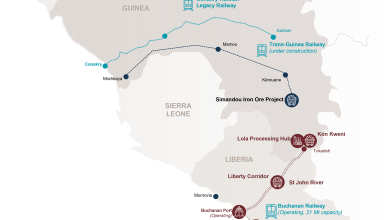Guinea to revoke mining rights of non-compliant companies

The government of Guinea has issued directive to revoke mining licenses and concessions from companies that fail to meet their legal and contractual obligations. President, General Mamadi Doumbouya said the move marks a strong policy shift aimed at ensuring mining operations contribute more directly to the country’s long-term development goals.
According to Information Minister Fana Soumah, the President emphasized that adherence to agreements and project timelines is “non-negotiable.” Although no specific companies were officially named, the statement follows media reports that Guinea is planning to cancel the bauxite license of a subsidiary of Emirates Global Aluminium (EGA) for not fulfilling its promise to construct a local alumina refinery.
Industrial growth
This move underscores the government’s focus on increasing in-country processing of raw materials, particularly bauxite, which Guinea produces more of than any other nation. By pushing companies to build processing plants, the country seeks to capture more value from its natural resources, create skilled jobs, and foster local industrial growth.
The government has openly commended China’s State Power Investment Corporation (SPIC) for initiating construction on an alumina refinery, describing it as a major step toward industrialization and economic diversification. This public praise reinforces the administration’s preference for companies that align with national priorities, such as local value addition and infrastructure development.
This approach reflects a broader trend among resource-rich nations, especially in Africa, to demand more accountability and economic benefits from international investors. Guinea’s new enforcement strategy is designed to shift the country away from simply exporting raw materials and toward building a more resilient, value-driven economy.
Foreign mining firms now face increased pressure to meet their obligations, including: Timely development of processing facilities, construction of supporting infrastructure, compliance with local employment and supply chain requirements, and delivery of financial benefits to communities and the state.
The policy change could reshape Guinea’s investment landscape, with companies needing to reassess their strategies to remain in good standing. Operators already meeting these expectations may benefit from a more favorable regulatory environment, while non-compliant entities risk losing access to one of the world’s most resource-rich regions.






